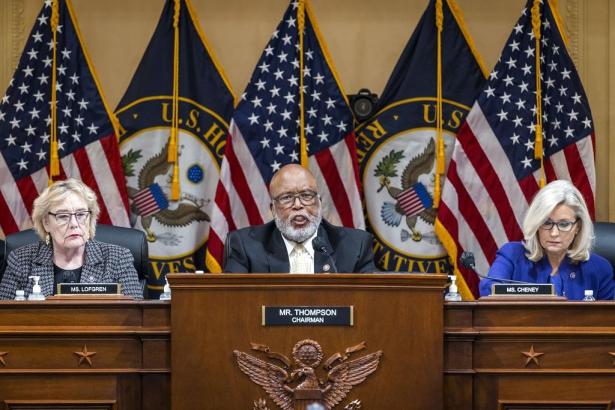On Monday, the House committee investigating the January 6th insurrection moved from the realm of facts—which they’d uncovered and documented both thoroughly and dramatically—to those of law and history. They cited four separate laws that they believed their evidence showed that former President Trump had violated, the most serious being the statute against inciting an insurrection and giving aid and comfort to the insurrectionists. And they referred their recommendations for prosecution to the Justice Department. As to history: Well, they secured their entry into its annals by adding to the very short list of congressional investigations that exposed a fundamental wrong and persuasively sought to right it.
The committee’s most obvious antecedent is the Senate committee, chaired by North Carolina’s Sam Ervin (who cloaked a wily legal mind behind the facade of a good ol’ boy), that investigated Watergate and turned up, among much else, the unanticipated revelation that Richard Nixon had secretly recorded all of his meetings. By the time those hearings had concluded, Nixon’s continuing tenure in office, not to mention the legitimacy of his continuing presidency, hung by a thread. Other such impactful hearings include Henry Waxman’s takedown of tobacco company CEOs, and the Progressive Era’s Pujo Committee hearings into the chicanery of America’s leading bankers.
The key to the January 6th Committee’s success was its focus on Trump. They documented how he’d planned weeks before Election Day to claim victory even if he lost; how he knew that he had in fact lost; how he sought to get state election officials, his own Justice Department, and poor Mike Pence to overturn that outcome; how he summoned a mob to Washington and, knowing that members of that mob were armed, sent them to the Capitol to disrupt, delay, and somehow reverse the formal announcement of Joe Biden’s victory; and how he refused during three hours of the ensuing mayhem to tell that mob to stand down.
That wasn’t the only factor in the committee’s success. The presentations by its members—most notably, Liz Cheney—were at no point tendentious and, at least in Cheney’s case, both heartfelt and eloquent. The committee’s decision to hire former network news executive James Goldston, formerly of Nightline and Good Morning America, to help craft their broadcast hearings amply paid off in the clarity and drama with which they presented their case.
I’m not a lawyer and can’t even begin to assess the legal thresholds that today’s referrals will have to surmount to persuade the Justice Department to indict Donald Trump. What I do know is that Attorney General Merrick Garland’s headaches have just become migraines. On CNN immediately following today’s hearings, former FBI Director Andrew McCabe suggested that summoning an insurrection might be a hard charge to prove. But in the court of public opinion (at least, that portion of the public that doesn’t believe empiricism is a satanic plot) and in the verdict of history, it’s not clear how Trump’s 187-minute refusal to tell his goons to stand down doesn’t constitute providing aid and comfort to insurrectionists.
The key to the January 6th Committee’s success was its focus on Trump.
The headaches won’t afflict just the AG. How are Rupert Murdoch’s minions going to respond to yesterday’s referrals, now that they’ve literally relegated Trump to page 27 of the New York Post? The highbrow stooges who write Wall Street Journal editorials will likely take a “let sleeping dogs lie” line: Trump is yesterday’s man; let’s move on to something more important, like cutting Social Security. But what of Fox News, where Trump has recently become He Whose Name Shall Not Be Mentioned? Even as they bang the drums for Ron DeSantis, Tucker & Co. know their viewers expect savage denunciations of the January 6th Committee and at least some defense of the God That Failed. That’s not Garland’s conundrum, but it’s a conundrum nonetheless.
If Justice does go ahead with a Trump prosecution, it’s also not clear how that will affect the 2024 Republican primary electorate. Polls now show that Trump has fallen well behind DeSantis as Republicans’ preferred choice. But prosecuting Trump will likely stir his remaining followers to swamp the polling places on primary day, and if DeSantis is just one of several non-Trumps on the ballot, that could perhaps give Trump a sufficient plurality to claim the nomination. That, of course, would immeasurably help Joe Biden win a second term, or if Biden doesn’t run, ease any Democratic nominee’s glide path into the White House. In which case, indicting Trump might actually be the smart move, politically, for the migraine-mired Merrick.
At the break in the session of the Army-McCarthy hearings that followed attorney Joseph Welch thundering at Joe McCarthy, “Have you no decency, sir?” the great Murray Kempton noted that the crowd in the room spontaneously applauded Welch, and that among those applauding were a couple of newspaper photographers. Kempton added, “I have never believed before that a press photographer cared whether any subject lived or died.”
At the conclusion of yesterday’s final session, as the January 6th Committee members rose to leave the room, the crowd applauded. I wasn’t there to see what the photographers did, but I’m pretty sure I know how future historians will respond.
===


Spread the word